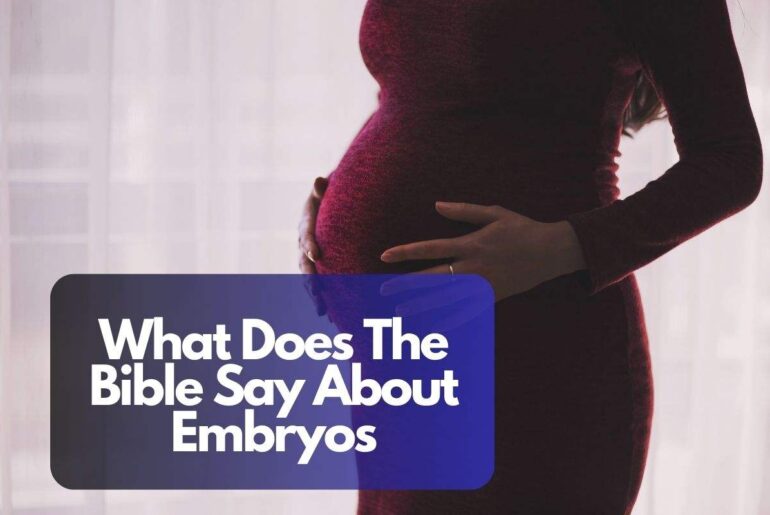Drawing from the Old and New Testaments, we will embark on a journey through scripture, seeking insight into the Bible’s stance on the beginnings of life, the intrinsic value of embryos, and the responsibilities bestowed upon humanity in their regard.
By examining key passages and considering various interpretations, we hope to shed light on the Bible’s teachings and provoke thoughtful reflection on this complex subject.
Contents
What Does The Bible Say About Embryos
Understanding the biblical perspective on embryos involves examining the teachings and principles found in the Bible regarding the beginning stages of human life. It seeks to explore what the scriptures say about the nature of embryos, their value, and the ethical considerations surrounding them. The topic is significant because it addresses questions about the sanctity of life, and the role of God in creation, and provides guidance on how to approach issues related to embryos and their development.
Importance of understanding the biblical perspective on embryos
1. Moral and Ethical Guidance: The Bible is a foundational text for many individuals and communities, shaping their beliefs and values. Understanding the biblical perspective on embryos provides a moral and ethical framework for addressing complex issues such as abortion, reproductive technologies, and medical interventions involving embryos. It offers insights into the sanctity of life and provides guidance on how to approach these matters in light of biblical principles.
2. Human Dignity and Value: The biblical perspective on embryos emphasizes the inherent worth and value of every human being, including those in the earliest stages of development. It helps us recognize that each embryo is a unique creation of God, deserving of respect, protection, and care. Understanding this perspective enables us to cultivate a deeper appreciation for the dignity and sanctity of human life from its very beginnings.
3. Personal Decision-Making: For individuals grappling with choices related to reproductive health, assisted reproductive technologies, or issues surrounding pregnancy, understanding the biblical perspective on embryos can inform their decision-making process. It provides a moral framework and a spiritual lens through which they can evaluate their options and make choices that align with their faith and values.
4. Engagement in Social and Bioethical Discourse: The biblical perspective on embryos has relevance beyond individual decision-making. It contributes to wider discussions in society and the bioethical realm, influencing debates on topics such as abortion laws, embryonic stem cell research, and the regulation of reproductive technologies. Understanding the biblical perspective equips individuals to engage in these discussions, offer informed viewpoints, and contribute to shaping ethical policies and practices.
5. Spiritual Reflection and Worship: For believers, understanding the biblical perspective on embryos fosters spiritual reflection and deepens their understanding of God’s involvement in the creation of life. It can inspire gratitude, awe, and reverence for God’s design and purpose in the intricate development of human beings. It provides a foundation for worship and prayer, acknowledging the Creator’s sovereignty and seeking guidance on matters pertaining to life and reproduction.
The Concept of Life in the Bible
The belief in God as the creator of life
The Bible establishes the foundational belief that God is the ultimate creator of all life. In Genesis 1:27, it states that God created human beings in His own image, emphasizing His role as the source and giver of life. This belief underscores the significance and divine origin of life, including the earliest stages of development.
Human beings as unique creations made in the image of God
The biblical concept of the “image of God” affirms the inherent worth and dignity of every human being. Genesis 1:26-27 teaches that God created humanity in His image, endowing them with qualities and attributes that reflect His character. This includes the unborn, who are regarded as bearing the divine imprint and possessing intrinsic value and significance.
The sacredness and value of human life
The Bible consistently upholds the sacredness and value of human life. Psalm 139:13-16 describes how God knit individuals together in the womb, intricately forming them. This passage emphasizes God’s intimate involvement in the development of each person, highlighting the sanctity and inherent worth of every human life, even in its earliest stages.
Biblical Views on the Unborn
Scriptures highlighting the development and formation of the unborn
Numerous passages in the Bible recognize the developmental process and formation of the unborn. Psalm 139:13-16, mentioned earlier, speaks of God’s active role in shaping individuals in the womb. Jeremiah 1:5 states that God knew the prophet Jeremiah before he was formed in the womb, suggesting God’s awareness and care for the unborn.
Recognition of the unborn as persons with inherent value
The Bible affirms the personhood and inherent value of the unborn. Luke 1:41 recounts the encounter between Mary, pregnant with Jesus, and Elizabeth, pregnant with John the Baptist. When Mary greeted Elizabeth, the baby in Elizabeth’s womb leaped, indicating recognition and personal response. This passage implies the personhood and significance of the unborn.
Examples of biblical figures interacting with unborn children
The Bible includes accounts of individuals interacting with unborn children, illustrating the value placed on their lives. One notable example is the encounter between Mary and Elizabeth in Luke 1:39-45. When Mary visited Elizabeth while both were pregnant, Elizabeth’s baby, John, leaped into her womb, and Elizabeth was filled with the Holy Spirit. This event demonstrates the recognition of the unborn as living beings capable of interaction and spiritual experience.
These biblical perspectives on the concept of life and the unborn establish a foundation for understanding the significance and value attributed to embryos and the unborn. They underscore the belief that life begins at conception and that every human being, from the moment of conception, bears the divine imprint, deserving respect, protection, and care.
God’s Care and Concern for the Unborn
God’s involvement in the creation and development of each individual
The Bible affirms that God is intimately involved in the creation and development of every individual, including embryos. Psalm 139:13 declares that God formed our inward parts and knitted us together in our mother’s womb. This verse highlights God’s active role as the divine Creator, carefully fashioning each person.
The role of God in the formation of embryos
Scriptures portray God as the primary agent in the formation of embryos. In Job 31:15, Job acknowledges that God made him in the womb. This recognition emphasizes God’s sovereignty over human life, including its earliest stages. It suggests that the development of embryos is a part of God’s purposeful design and plan.
God’s intimate knowledge of each person from conception
The Bible reveals that God has intimate knowledge of every individual from the moment of conception. Psalm 139:16 states that God saw our unformed substance and recorded all the days ordained for us before one of them came to be. This verse underscores God’s omniscience and His awareness of each person’s existence, even before birth.
Biblical Teachings on Abortion
The commandment “You shall not murder” and its implications
The sixth commandment, “You shall not murder” (Exodus 20:13), establishes the foundational principle of preserving human life. The deliberate termination of innocent human life, including through abortion, contradicts this commandment. It reflects the biblical belief in the sanctity and inviolability of human life.
Scriptures condemning the shedding of innocent blood
The Bible consistently condemns the shedding of innocent blood, which includes the taking of innocent lives through abortion. Proverbs 6:16-17 lists shedding innocent blood as one of the six things the Lord hates. This highlights God’s abhorrence towards the unjust taking of innocent lives, further emphasizing the biblical stance against abortion.
The biblical view on the sanctity of life from conception
The Bible presents a consistent view of the sanctity of life from conception. Jeremiah 1:5 states that God knew and set apart the prophet Jeremiah before he was formed in the womb. This verse suggests that personhood and divine purpose are attributed to individuals even before birth, affirming the inherent value and dignity of every human life, regardless of developmental stage.
Overall, the Bible teaches that God is intricately involved in the creation and formation of embryos, demonstrating His care and concern for the unborn. It emphasizes the sacredness and value of human life, including embryos, and condemns the intentional taking of innocent lives. The biblical teachings on abortion reinforce the sanctity of life from conception and affirm the moral responsibility to protect and preserve the lives of the unborn.
Ethical Considerations and Interpretations
Different interpretations and perspectives on when life begins
Within the biblical framework, there are different interpretations and perspectives on when life begins. While many believe that life begins at conception based on biblical principles, some interpret certain passages or emphasize different aspects of the developmental process to support alternative views. These differences in interpretation contribute to ongoing discussions and debates surrounding the timing of the beginning of life.
Discussions on the morality of assisted reproductive technologies (ART)
Assisted reproductive technologies (ART) raise ethical questions within the context of the biblical perspective on embryos. Topics such as in vitro fertilization (IVF), embryo freezing, and genetic screening provoke discussions on the sanctity of human life, the potential for multiple embryos, and the appropriate use of medical intervention in the reproductive process. Christians engage in debates about the morality and ethical implications of these technologies, seeking to align their decisions with biblical principles.
Addressing complex issues such as miscarriage, ectopic pregnancy, and selective reduction
The biblical perspective on embryos also confronts complex issues like miscarriage, ectopic pregnancy, and selective reduction. Miscarriage, the loss of a pregnancy, raises questions about the significance of early-stage embryos and the grief experienced by those affected. Ectopic pregnancies, where the embryo implants outside the uterus, present medical and ethical dilemmas. Selective reduction, the reduction of multiple embryos in multiple pregnancies, brings ethical considerations regarding the value and treatment of embryos. These complex issues require sensitivity, compassion, and biblical discernment to navigate.
Conclusion
The biblical perspective on embryos emphasizes the belief in God as the creator of life, the sanctity and value of human life from conception, and God’s care for the unborn. It affirms that life begins at conception, recognizes the intimate involvement of God in the formation of embryos, and underscores the importance of protecting and valuing every human life, including the unborn.
Understanding the biblical perspective on embryos is a journey that requires personal study, reflection, and seeking wisdom from trusted sources. It is important to engage with scripture, theological teachings, and ethical discussions to develop a comprehensive understanding of this complex topic.
The biblical perspective on embryos serves as a reminder of the value and dignity of every human life, from conception to natural death. It calls believers to advocate for the protection of the unborn, offer support and compassion to those facing reproductive challenges, and engage in discussions and actions that uphold the sanctity of human life. The biblical teachings on embryos reinforce the profound truth that every person, regardless of their stage of development, is uniquely created by God and deserving of love, care, and respect.








